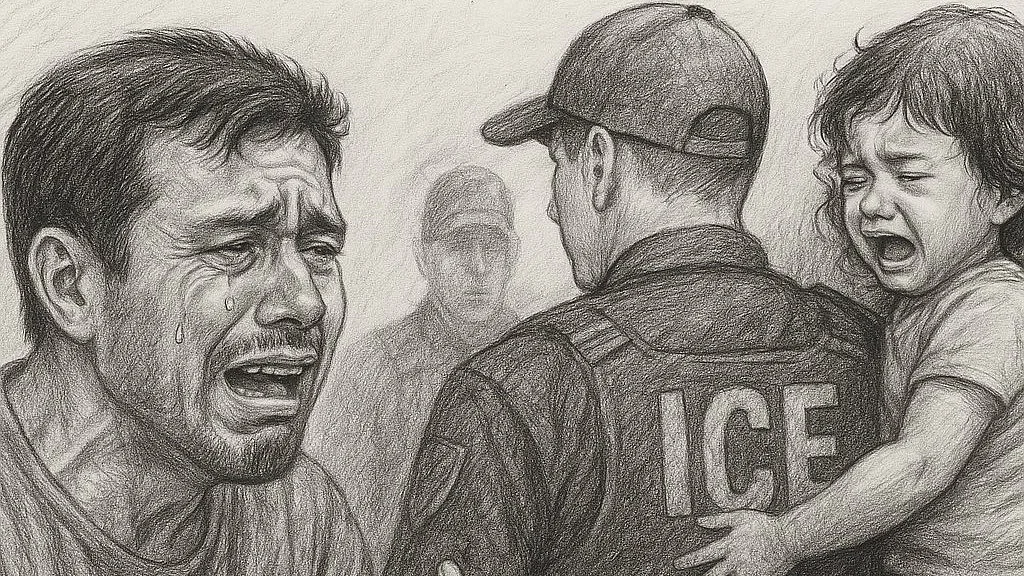US citizen children deported with mothers, ICE actions raise alarming human rights concerns
Among the deportees: mother of one-year-old without the baby, and three children aged two, four and seven — all US citizens

In a series of deeply troubling incidents, US Immigration and Customs Enforcement (ICE) officers have recently deported the Cuban-born mother of a one-year-old girl, effectively separating them indefinitely, along with three children aged two, four and seven — all US citizens — and their Honduran-born mothers, according to statements made by their lawyers on Saturday.
These cases cast a harsh spotlight on the current state of immigration enforcement, raising urgent questions about who is being deported and why. They unfold against the backdrop of an ongoing legal battle in federal courts over whether President Donald Trump's immigration policies have gone too far, too fast, and at the expense of fundamental human rights.
Lawyers representing the affected families described a grim pattern of events: the women were arrested during routine check-ins at ICE offices, denied meaningful access to legal counsel or family contact, and subsequently deported within three days or less.
The American Civil Liberties Union (ACLU), the National Immigration Project, and allied organisations issued a joint statement condemning ICE’s actions. They characterised the deportations of US citizen children and their mothers as a “shocking — although increasingly common — abuse of power”.
Gracie Willis of the National Immigration Project emphasised that the mothers were deprived of a fair opportunity to decide whether their children should remain in the US. “We have no idea what ICE was telling them, and in this case what has come to light is that ICE didn’t give them another alternative,” Willis said during an interview. “They didn’t gave them a choice, that these mothers only had the option to take their children with them despite loving caregivers being available in the United States to keep them here.”
The situation of the four-year-old — currently battling a rare form of cancer — and the seven-year-old is especially heart-wrenching. Both children were deported to Honduras within a day of being detained alongside their mother, Willis confirmed.
In another case, concerning a two-year-old girl, a federal judge in Louisiana has questioned the legality of the child's deportation, asserting that the government failed to adequately demonstrate that due process had been followed.
Lawyers representing the child’s father argued that he wished for his daughter to remain with him in the US. Meanwhile, ICE maintained that the mother wanted her daughter to accompany her to Honduras — conflicting claims that were not thoroughly examined by US district judge Terry Doughty.
Doughty, in a Friday order, scheduled a hearing for 16 May, writing that it was necessary “in the interest of dispelling our strong suspicion that the Government just deported a U.S. citizen with no meaningful process.”
The Honduran-born mother — who is pregnant — was arrested on Tuesday alongside her two-year-old daughter and her 11-year-old Honduran-born sister during a routine check-in at an ICE office in New Orleans. The family had been living in Baton Rouge.
In a striking illustration of the bureaucratic coldness of the situation, Doughty attempted to contact the woman while she was aboard a deportation flight, only to be informed less than an hour later that she had already been “released in Honduras”.
In court filings, lawyers for the father alleged that ICE was using the detention of the two-year-old girl as leverage to compel the father to turn himself in. Though his immigration status remains unclear, his lawyers stated that he had legally delegated custody of his daughters to his sister-in-law, a US citizen residing in Baton Rouge.
Meanwhile, in Florida, a similarly distressing case has unfolded. A Cuban-born mother of a one-year-old girl, married to a US citizen, was detained at a scheduled check-in at an ICE office in Tampa, according to her lawyer.
Heidy Sánchez was detained without access to communication and deported to Cuba just two days later. Her lawyer, Claudia Cañizares, disclosed that Sánchez is still breastfeeding her daughter, who suffers from seizures.
Cañizares recounted that she attempted to submit legal paperwork to ICE to contest the deportation on Thursday morning, only to be told Sánchez had already been deported — a claim Cañizares disputes.
She explained that she had planned to reopen Sánchez’s immigration case to seek legal status for her in the United States, but ICE allegedly told her that Sánchez could pursue her case from Cuba. “I think they’re following orders that they need to remove a certain amount of people by day and they don’t care, honestly,” Cañizares said.
Sánchez is not a criminal, and according to her lawyer, she presents a strong humanitarian case for remaining in the United States. Nonetheless, ICE appears to be prioritising deportation targets over the nuances of individual circumstances.
Sánchez’s deportation stems from a missed immigration hearing in 2019, which led to her detention for nine months. At that time, Cuba reportedly refused to accept her return, resulting in her release in 2020 under the condition that she regularly check in with ICE — a requirement she had been complying with until her sudden removal.
With PTI/AP inputs
Follow us on: Facebook, Twitter, Google News, Instagram
Join our official telegram channel (@nationalherald) and stay updated with the latest headlines
